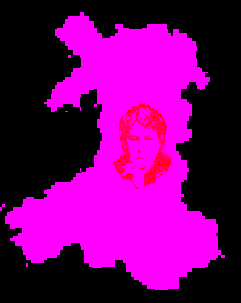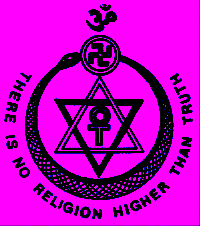
The All
Getting Started in Theosophy
(And its all
Free Stuff )
But you don’t
have to live in Wales
to find this guide useful
Theosophy has no
dogma, no priesthood
or diploma elite and recognizes no
spiritual head.
All ideas presented at meetings are
for consideration.
Please click here for Current Theosophical Events in
Cardiff
Helena Petrovna Blavatsky
1831 – 1891
____________________

Reincarnation
From
A
Textbook of Theosophy
By
C
This life of the ego in his own world, which is so
glorious and so fully satisfying for the developed man, plays but a very small
part in the life of the ordinary person, for in his case the ego has not yet
reached a sufficient stage of development to be awake in his causal body. In
obedience to the law of nature he has withdrawn into it, but in doing so he has
lost the sensation of vivid life, and restless desire to feel this once more
pushes him in the direction of another descent into matter.
This is the scheme of evolution appointed for man at
the present stage – that he shall develop by descending into grosser matter,
and then ascend to carry back into himself the result of the experiences so
obtained. His real life, therefore, covers millions of years, and what we are
in the habit of calling a life is only one day of this greater existence.
Indeed, it is in reality only a small part of one day; for a life of seventy
years in the physical world is often succeeded by a period of twenty times that
length spent in higher spheres.
Every one of us has a long line of these physical
lives behind him, and the ordinary man has a fairly long line still in front of
him. Each of such lives is a day at school. The ego puts upon himself his
garment of flesh and goes forth into the school of the physical world to learn
certain lessons. He learns them, or does not learn them, or partially learns
them, as the case may be, during his school day of earth life; then he lays
aside the vesture of the flesh and returns home to his own level for rest and
refreshment. In the morning of each new life he takes up again his lesson at
the point where he left it the night before. Some lessons he may be able to
learn in one day, while others may take him many days.
If he is an apt pupil and learns quickly what is
needed, if he obtains an intelligent grasp of the rules of the school, and
takes the trouble to adapt his conduct to them, his school life is
comparatively short, and when it is over he goes forth fully equipped into the
real life of the higher worlds for which all this is only a preparation. Other
egos are duller boys who do not learn so quickly; some of them do not
understand the rules of the school, and through that ignorance are constantly
breaking them; others are wayward, and even when they see the rules they cannot
at once bring themselves to act in harmony with them. All of these have a
longer school life, and by their own actions they delay their entry upon the
real life of the higher worlds.
For this is a school in which no pupil ever fails;
every one must go on to theend. He has no choice as to that; but the length of
time which he will take in qualifying himself for the higher examinations is
left entirely to his owndiscretion. The wise pupil, seeing that school life is
not a thing in itself, but only a preparation for a more glorious and far wider
life, endeavors to comprehend as fully as possible the rules of his school, and
shapes his life in accordance with them as closely as he can, so that no time
may be lost in the learning of whatever lessons are necessary. He co-operates
intelligently with the Teachers, and sets himself to do the maximum of work
which is possible for him, in order that as soon as he can he may come of age
and enter into his kingdom as a glorified ego.
Theosophy explains to us the laws under which this
school life must be lived, and in that way gives a great advantage to its
students. The first great law is that of evolution. Every man has to become a
perfect man, to unfold to the fullest degree the divine possibilities which lie
latent within him, for that unfoldment is the object of the entire scheme so
far as he is concerned. This law of evolution steadily presses him onward to
higher and higher achievements.
The wise man tries to anticipate its demands – to run
ahead of the necessary curriculum, for in that way he not only avoids all
collision with it, but he obtains the maximum of assistance from its action.
The man who lags behind in the race of life finds its steady pressure
constantly constraining him – a pressure which, if resisted, rapidly becomes
painful. Thus the laggard on the path of evolution has always the sense of
being hunted and driven by fate, while the man who intelligently co-operates is
left perfectly free to choose the direction in which he shall move, so long as
it is onward and upward.
The second great law under which this evolution is
taking place is the law of cause and effect. There can be no effect without its
cause, and every cause must produce its effect. They are in fact not two but
one, for the effect is really part of the cause, and he who sets one in
motion sets the other also. There is in
Nature no such idea as that of reward or punishment, but only of cause and
effect. Any one can see this in connection with mechanics or chemistry; the
clairvoyant sees it equally clearly with regard to the problems of evolution.
The same law obtains in the higher as in the lower
worlds; there, as here, the angle of reflection is always equal to the angle of
incidence. It is a law of mechanics that action and reaction are equal and
opposite. In the almost infinitely finer matter of the higher worlds the
reaction is by no means always
instantaneous; it may sometimes be spread over long
periods of time, but it returns inevitably and exactly.
Just as certain in its working as the mechanical law
in the physical world is the higher law, according to which the man who sends
out a good thought or does a good action receives good in return, while the man
who sends out an evil thought or does an evil action receives evil in return
with equal accuracy – once more, not in the least as a reward or punishment
administered by some external will, but simply as the definite and mechanical
result of his own activity. Man has learnt to appreciate a mechanical result in
the physical world, because the reaction is usually almost immediate and can be
seen by him. He does not invariably understand the reaction in the higher
worlds because that takes a wider sweep, and often returns not in this physical
life, but in some future one.
The action of this law affords the explanation of a
number of the problems of ordinary life. It accounts for the different
destinies imposed upon people, and also for the differences in the people
themselves. If one man is clever in a certain direction and another is stupid,
it is because in a previous life the clever man has devoted much effort to
practice in that particular direction, while the stupid man is trying it for
the first time. The genius and the precocious child are examples not of the
favoritism of some deity but of the result produced by previous lives of
application. All the varied circumstances which surround us are the result of
our own actions in the past, precisely as are the qualities of which we find
ourselves in possession. We are what we have made ourselves, and our
circumstances are such as we have deserved.
There is, however, a certain adjustment or
apportionment of these effects. Though the law is a natural law and mechanical
in its operation, there are nevertheless certain great Angels who are concerned
with its administration.
They cannot change by one feather weight the amount of
the result which follows upon any given thought or act, but they can within
certain limits expedite or delay its action, and decide what form it shall
take.
If this were not done there would be at least a
possibility that in his earlier stages the man might blunder so seriously that
the results of his blundering might be more than he could bear. The plan of the
Deity is to give man a limited amount of freewill; if he uses that small amount
well, he earns the right to a little more next time; if he used it badly,
suffering comes upon him as the result of such evil use, and he finds himself
restrained by the result of his previous actions. As the man learns how to use
his free will, more and more of it is entrusted to him, so that he can acquire
for himself practically unbounded freedom in the direction of good, but his
power to do wrong is strictly restricted. He can progress as rapidly as he
will, but he cannot wreck his life in his ignorance. In the earlier stages of
the savage life of primitive man it is natural that there should be on the
whole more of evil than of good, and if the entire result of his actions came
at once upon a man as yet so little developed, it might well crush the newly
evolved powers which are still so feeble.
Besides this, the effects of his actions are varied in
character. While some of them produce immediate results, others need much more
time for their action, and so it comes to pass that as the man develops he has
above him a hovering cloud of undischarged results, some of them good, some of
them bad. Out of this mass (which we may regard for the purposes of analogy
much as though it were a debt owing to the powers of nature) a certain amount
falls due in each of his successive births; and that amount, so assigned, may
be thought of as the man’s destiny for that particular life.
All that it means is that a certain amount of joy and
a certain amount of suffering are due to him, and will unavoidably happen to
him; how he will meet this destiny and what use he will make of it, that is
left entirely to his own option. It is a certain amount of force which has to
work itself out. Nothing can prevent the action of that force, but its action
may always be modified by the application of a new force in another direction,
just as is the case in mechanics. The result of past evil is like any other debt;
it may be paid in one large check upon the bank of life – by some one supreme
catastrophe; or it may be paid in a number of smaller notes, in minor troubles
and worries; in some cases it may even be paid in the small change of a vast
number of petty annoyances. But one thing is quite certain – that, in some form
or other, paid it will have to be.
The conditions of our present life, then, are
absolutely the result of our own action in the past; and the other side of that
statement is that our actions in this life are building up conditions for the
next one.
A man who finds himself limited either in powers or in
outer circumstances may not always be able to make himself or his conditions
all that he would wish in this life; but he can certainly secure for the next
one whatever he chooses.
Man’s every action ends not with himself, but
invariably affects others around him. In some cases this effect may be
comparatively trivial, while in others it may be of the most serious character.
The trivial results, whether good or bad are simply small debits or credits in
our account with Nature; but the greater effects, whether good or bad, make a
personal account which is to be settled with the individual concerned.
A man who gives a meal to a hungry beggar, or cheers
him by a kindly word, will receive the result of his good action as part of a
kind of general fund of Nature’s benefits; but one who by some good action
changes the whole current of another man’s life will assuredly have to meet
that same man again in a future life, in order that he who has been benefited
may have the opportunity of repaying the kindness that has been done to him.
One who causes annoyance to another will suffer
proportionately for it somewhere, somehow, in the future, though he may never
meet again the man whom he has troubled; but one who does serious harm to
another, one who wrecks his life or retards his evolution, must certainly meet
his victim again at some later point in the course of their lives, so that he
may have the opportunity, by kindly and self-sacrificing service, of
counterbalancing the wrong which he has done. In short, large debts must be
paid personally, but small ones go into the general fund.
In every nation there exist an almost infinite number
of diverse conditions, riches and poverty, a wide field of opportunities or a
total lack of them, facilities for development or conditions under which
development is difficult or well-nigh impossible. Amidst all these infinite
possibilities the pressure of the law of evolution tends to guide the man to
precisely those which best suit his needs at the stage at which he happens to
be.
But the action of this law is limited by that other
law of which we spoke, the law of cause and effect. The man’s actions in the
past may not have been such as to deserve (if we may put it so) the best
possible opportunities; he may have set in motion in his past certain forces
the inevitable result of which will be to produce limitations; and these
limitations may operate to prevent his receiving that best possible of
opportunities, and so as the result of his own actions in the past he may have
to put up with the second-best. So we may say that the action of the law of
evolution, which if left to itself would do the very best possible for every man,
is restrained by the man’s own previous actions.
An important feature in that limitation – one which
may act most powerfully for good or for evil – is the influence of the group of
egos with which the man has made definite links in the past – those with whom
he has formed strong ties of love or hate, of helping or of injury – those
souls whom he must meet again because of connections made with them in days of
long ago. His relation with them is a factor which must be taken into
consideration before it can be determined where and how he shall be reborn.
The will of the Deity is man’s evolution. The effort
of that nature which is an expression of the Deity is to give the man whatever
is most suitable for that evolution; but this is conditioned by the man’s
deserts in the past and by the links which he has already formed. It may be
assumed that a man descending into incarnation could learn the lessons
necessary for that life in any one of a hundred positions. From half of these
or more than half he may be debarred by the consequences of some of his many
and varied actions in the past.
Among the few possibilities which remain open to him,
the choice of one possibility in particular may be determined by the presence
in that family or in that neighborhood of other egos upon whom he has a claim
for services rendered, or to whom he in his turn owes a debt of love.
______________________
The All
Guide to
Getting Started in Theosophy
_______________________
Find
out more about
Theosophy
with these links
Cardiff
Theosophical Society meetings are informal
and there’s always a cup of tea afterwards
The Cardiff Theosophical Society Website
The National Wales Theosophy Website
Theosophy Cardiff’s Instant Guide
One liners and quick explanations
H P Blavatsky is usually the only
Theosophist that most people have ever
heard of. Let’s put that right
The Voice of the Silence Website
Dave’s
Streetwise Theosophy Boards
If you run a Theosophy Study Group,
please feel free to use any material
on this site
If you run a
Theosophy Group you can use
this as an
introductory handout
It’s all “water
under the bridge” but everything you do
makes an imprint
on the Space-Time Continuum.
An Independent Theosophical Republic
Links to Free Online Theosophy
Study Resources; Courses, Writings,
The main criteria
for the inclusion of
links on this
site is that they have some
relationship
(however tenuous) to Theosophy
and are
lightweight, amusing or entertaining.
Topics include
Quantum Theory and Socks,
Dick Dastardly and Legendary Blues Singers.
Lentil burgers, a
thousand press ups before breakfast and
the daily 25 mile
run may put it off for a while but death
seems to get most
of us in the end. We are pleased to
present for your
consideration, a definitive work on the
subject by a
Student of Katherine Tingley entitled
No
Aardvarks were harmed in the
National Wales
Centre for Theosophy
Blavatsky Wales
Theosophy Group
The Spiritual Home of Urban Theosophy
The Earth Base for Evolutionary Theosophy
The Birmingham Annie Besant Lodge
_______________________
Tekels Park to be Sold to a Developer
Concerns about
the fate of the wildlife as
Tekels Park is to be Sold to a
Developer
Concerns are raised about the fate of
the wildlife as
The Spiritual Retreat, Tekels Park in
Camberley,
Surrey, England is to be sold to a
developer.
Tekels Park is a
50 acre woodland park, purchased
for the Adyar Theosophical Society in England
in 1929.
In addition to
concern about the park, many are
worried about the future of the Tekels Park
Deer
as they are not a
protected species.
Confusion as the
Theoversity moves out of
Tekels Park to Southampton,
Glastonbury &
Chorley in Lancashire while the
leadership claim
that the Theosophical Society will
carry on using
Tekels Park despite its sale to a developer
Anyone planning a
“Spiritual” stay at the
Tekels Park Guest
House should be aware of the sale.
Tekels Park & the Loch Ness Monster
A Satirical view
of the sale of Tekels Park
in Camberley,
Surrey to a developer
The Toff’s Guide to the Sale of Tekels Park
What the men in
top hats have to
say about the
sale of Tekels Park
________________________
The Theosophy
The Theosophy Cardiff Guide to
The Theosophy Cardiff Guide to
The Theosophy Cardiff Guide to
The Terraced Maze of Glastonbury Tor
Glastonbury and
Joseph of Arimathea
The Grave of King Arthur & Guinevere
Views of Glastonbury High Street
The Theosophy Cardiff Guide to
_____________________
Quick Explanations with Links
to More Detailed Info
What is Theosophy ? Theosophy Defined (More Detail)
Three Fundamental Propositions Key Concepts of Theosophy
Cosmogenesis
Anthropogenesis
Root Races
Karma
Ascended Masters After Death States Reincarnation
The Seven Principles of Man Helena Petrovna Blavatsky
Colonel Henry Steel Olcott William Quan Judge
The Start of the Theosophical Society Theosophical Society Presidents
History of the Theosophical Society Glossaries of Theosophical Terms
History of the Theosophical Society in Wales
The Three Objectives of the Theosophical Society
Explanation of the Theosophical Society Emblem
Try these if you don’t live in
and are looking for a
Local Theosophy Group or Centre
UK Listing of Theosophical Groups
____________________________
Theosophy has no
dogma, no priesthood
or diploma elite and recognizes no
spiritual head.
All ideas presented at meetings are
for consideration.
Please click here for Current Theosophical Events in
Cardiff


